Cognitive behavioural therapy for anxiety disorders in children and adolescents
- PMID: 25692403
- PMCID: PMC6491167
- DOI: 10.1002/14651858.CD004690.pub4
Cognitive behavioural therapy for anxiety disorders in children and adolescents
Abstract
Background: A previous Cochrane review (James 2005) showed that cognitive behavioural therapy (CBT) was effective in treating childhood anxiety disorders; however, questions remain regarding (1) the relative efficacy of CBT versus non-CBT active treatments; (2) the relative efficacy of CBT versus medication and the combination of CBT and medication versus placebo; and (3) the long-term effects of CBT.
Objectives: To examine (1) whether CBT is an effective treatment for childhood and adolescent anxiety disorders in comparison with (a) wait-list controls; (b) active non-CBT treatments (i.e. psychological placebo, bibliotherapy and treatment as usual (TAU)); and (c) medication and the combination of medication and CBT versus placebo; and (2) the long-term effects of CBT.
Search methods: Searches for this review included the Cochrane Central Register of Controlled Trials (CENTRAL) and the Cochrane Depression, Anxiety and Neurosis Group Register, which consists of relevant randomised controlled trials from the bibliographic databases-The Cochrane Library (1970 to July 2012), EMBASE, (1970 to July 2012) MEDLINE (1970 to July 2012) and PsycINFO (1970 to July 2012).
Selection criteria: All randomised controlled trials (RCTs) of CBT versus waiting list, active control conditions, TAU or medication were reviewed. All participants must have met the criteria of the Diagnostic and Statistical Manual (DSM) or the International Classification of Diseases (ICD) for an anxiety diagnosis, excluding simple phobia, obsessive-compulsive disorder, post-traumatic stress disorder and elective mutism.
Data collection and analysis: The methodological quality of included trials was assessed by three reviewers independently. For the dichotomous outcome of remission of anxiety diagnosis, the odds ratio (OR) with 95% confidence interval (CI) based on the random-effects model, with pooling of data via the inverse variance method of weighting, was used. Significance was set at P < 0.05. Continuous data on each child's anxiety symptoms were pooled using the standardised mean difference (SMD).
Main results: Forty-one studies consisting of 1806 participants were included in the analyses. The studies involved children and adolescents with anxiety of mild to moderate severity in university and community clinics and school settings. For the primary outcome of remission of any anxiety diagnosis for CBT versus waiting list controls, intention-to-treat (ITT) analyses with 26 studies and 1350 participants showed an OR of 7.85 (95% CI 5.31 to 11.60, Z = 10.26, P < 0.0001), but with evidence of moderate heterogeneity (P = 0.04, I² = 33%). The number needed to treat (NNT) was 6.0 (95% CI 7.5 to 4.6). No difference in outcome was noted between individual, group and family/parental formats. ITT analyses revealed that CBT was no more effective than non-CBT active control treatments (six studies, 426 participants) or TAU in reducing anxiety diagnoses (two studies, 88 participants). The few controlled follow-up studies (n = 4) indicate that treatment gains in the remission of anxiety diagnosis are not statistically significant.
Authors' conclusions: Cognitive behavioural therapy is an effective treatment for childhood and adolescent anxiety disorders; however, the evidence suggesting that CBT is more effective than active controls or TAU or medication at follow-up, is limited and inconclusive.
Conflict of interest statement
No potential conflicts of interest were reported for any of the review authors.
Figures
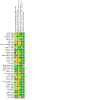
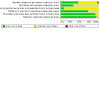
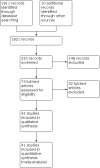
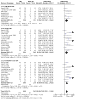
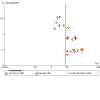
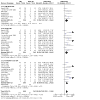
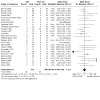
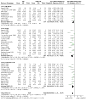
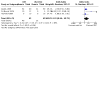
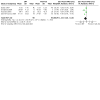
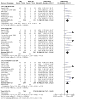
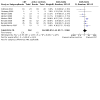
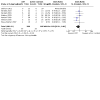
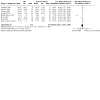
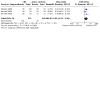
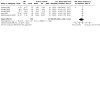
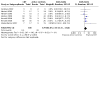
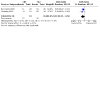
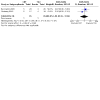
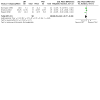
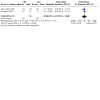
Update of
-
Cognitive behavioural therapy for anxiety disorders in children and adolescents.Cochrane Database Syst Rev. 2013 Jun 3;(6):CD004690. doi: 10.1002/14651858.CD004690.pub3. Cochrane Database Syst Rev. 2013. Update in: Cochrane Database Syst Rev. 2015 Feb 18;(2):CD004690. doi: 10.1002/14651858.CD004690.pub4. PMID: 23733328 Updated.
References
References to studies included in this review
Barrett 1996 {published and unpublished data}
-
- Barrett PM, Dadds MR, Rapee RM. Family treatment of childhood anxiety: a controlled trial. Journal of Consulting and Clinical Psychology 1996;64(2):333-42. - PubMed
Barrett 1998 {published and unpublished data}
-
- Barrett PM. Evaluation of cognitive-behavioral group treatments for childhood anxiety disorders. Journal of Clinical Child Psychology 1998;27(4):459-68. - PubMed
Barrington 2005 {published and unpublished data}
-
- Barrington J, Prior M, Richardson M, Allen K. Effectiveness of CBT versus standard treatment for childhood anxiety disorders in a community clinic setting. Behaviour Change 2005;22(1):29-43.
Chalfant 2007 {published data only}
-
- Chalfant AM, Rapee R, Carroll L. Treating anxiety disorders in children with high functioning autism spectrum disorders: a controlled trial. Journal of Autism and Developmental Disorders 2007;37:1842-57. - PubMed
Cobham 2012 {published data only}
-
- Cobham VE. Do anxiety-disordered children need to come into the clinic for efficacious treatment? Journal of Consulting and Clinical Psychology 2012;80(3):465-76. - PubMed
Dadds 1997 {published and unpublished data}
-
- Dadds MR, Spence SH, Holland DE, Barrett PM, Laurens KR. Prevention and early intervention for anxiety disorders: a controlled trial. Journal of Consulting and Clinical Psychology 1997;65:627-35. - PubMed
Dadds 1999 {published data only}
-
- Dadds MR, Hollanda DE, Laurens KR, Mullins M, Barrett PM, Spence SH. Early intervention and prevention of anxiety disorders in children: results at 2-year follow-up. Journal of Consulting and Clinical Psychology 1999;67(1):145-50. - PubMed
Flannery‐Schroeder 2000 {published data only}
-
- Flannery–Schroeder EC. Group versus individual cognitive behavioural treatment for anxiety-disordered children: a randomized clinical trial. Dissertation Abstracts International 1998;58 (10-B):5642.
-
- Flannery-Schroeder EC, Choudhury MS, Kendall PC. Group and individual cognitive-behavioral treatments for youth with anxiety disorders: 1-year follow-up. Cognitive Therapy and Research 2005;29(2):253-9.
-
- Flannery-Schroeder EC, Kendall PC. Group and individual cognitive-behavioral treatments for youth with anxiety disorders: a randomized clinical trial. Cognitive Therapy and Research 2000;24:251-78.
Galla 2012 {published and unpublished data}
-
- Galla BM, Wood JJ, Chiu AW, Langer DA, Jacobs J, Ifekwunigwe M, et al. One year follow-up to modular cognitive behavioral therapy for the treatment of pediatric anxiety disorders in an elementary school setting. Child Psychiatry & Human Development 2012;43(2):219-26. - PubMed
Gil‐Bernal 2009 {published data only}
-
- Gil-Bernal F, Hernandez- Guzman L. Cognitive behavioural treatment in Mexican children with social phobia [Tratamiento cognitivo-conductual para ninos mexicanos con fobia social]. Anuario de Psicologia 2009;40(1):89-104.
Ginsburg 2002 {published data only}
-
- Ginsburg GS, Drake KL. School-based treatment for anxious African American adolescents: a controlled pilot study. Journal of the American Academy of Child and Adolescent Psychiatry 2002;41:768-75. - PubMed
Ginsburg 2012 {published data only}
Hayward 2000 {published data only}
-
- Hayward C, Varady S, Albano AM, Thienemann M, Henderson L, Schatzberg AF. Cognitive-behavioral group therapy for social phobia in female adolescents: results of a pilot study. Journal of the American Academy of Child and Adolescent Psychiatry 2000;39:721-6. - PubMed
Herbert 2009 {published data only}
Hirshfeld‐Becker 2010 {published and unpublished data}
-
- Hirshfeld- Becker D, Masek B, Henin A, Blakely LR, Pollock-Wurman RA, McQuade J, et al. Cognitive behavioural therapy for 4- to 7-year old children with anxiety disorders: a randomized clinical trial. Journal of Consulting and Clinical Psychology 2010;78(4):498-510. - PubMed
Hudson 2009 {published and unpublished data}
-
- Hudson JL, Rapee RM, Deveney C, Schniering CA, Lyneham HJ, Bovopoulos N. Cognitive-behavioral treatment versus an active control for children and adolescents with anxiety disorders: a randomized trial. Journal of the American Academy of Child & Adolescent Psychiatry 2009;48(5):533-44. - PubMed
Kendall 1994 {published and unpublished data}
-
- Kendall PC. Treating anxiety disorders in youth: results of a randomized clinical trial. Journal of Consulting and Clinical Psychology 1994;62:100-10. - PubMed
Kendall 1997 {published and unpublished data}
-
- Kendall PC, Brady EU, Verduin TL. Comorbidity in childhood anxiety disorders and treatment outcome. Journal of the American Academy Child and Adolescent Psychiatry 2001;40:787-94. - PubMed
-
- Kendall PC, Flannery-Schroeder E, Panichelli-Mindel SM, Southam-Gerow M, Henin A, Warman M. Therapy for youths with anxiety disorders: a second randomized clinical trial. Journal of Consulting and Clinical Psychology 1997;65:366-80. - PubMed
Kendall 2008 {published data only}
-
- Kendall PC, Comer JS, Marker CD, Creed TA, Puliafico AC, Hughes AA. In-session exposure tasks and therapeutic alliance across the treatment of childhood anxiety disorders. Journal of Consulting & Clinical Psychology 2009;77(3):517-25. - PubMed
-
- Kendell PC, Hudson JL, Flannery-Schroeder E, Gosch E, Suveg C. Cognitive–behavioral therapy for anxiety disordered youth: a randomized clinical trial evaluating child and family modalities. Journal of Counselling and Clinical Psychology 2008;76(2):282-97. - PubMed
-
- Suveg C, Hudson JL, Brewer G, Flannery-Schroeder E, Gosch E, Kendall PC. Cognitive behavioural therapy for anxiety-disordered youth: secondary outcomes from a randomized clinical trial evaluating child and family modalities. Journal of Anxiety Disorders 2009;23(3):341-9. - PubMed
Lau 2010 {published data only}
-
- Lau W-Y, Kwok-Ying Chan C, Ching-Hong J, Kit-Fong Au T. Effectiveness of group cognitive-behavioral treatment for childhood anxiety in community clinics. Behaviour Research and Therapy 2010;48(11):1067-77. - PubMed
Masia‐Warner 2005 {published and unpublished data}
-
- Masia-Warner C, Klein RG, Dent HC, Fisher PH, Alvir J, Albano AM, et al. School-based intervention for adolescents with social anxiety disorder: results of a controlled study. Journal of Abnormal Child Psychology 2005;33(6):707-22. - PubMed
Masia‐Warner 2007 {published data only}
-
- Masia-Warner C, Fisher PH, Shrout PE, Rathor S, Klein RG. Treating adolescents with social anxiety disorder in school: an attention control trial. Journal of Child Psychology and Psychiatry 2007;48(7):676-86. - PubMed
Masia‐Warner 2011 {published data only}
McNally Keehn 2012 {published data only}
Melfsen 2011 {published data only}
Mendlowitz 1999 {published data only}
-
- Mendlowitz SL, Manassis K, Bradley S, Scapillato D, Miezitis S, Shaw BF. Cognitive-behavioral group treatments in childhood anxiety disorders: the role of parental involvement. Journal of the American Academy of Child and Adolescent Psychiatry 1999;38:1223-9. - PubMed
Muris 2002 {published data only}
-
- Muris P, Meesters C, Melick M. Treatment of childhood anxiety disorders: a preliminary comparison between cognitive-behavioral therapy and a psychological placebo intervention. Journal of Behavior Therapy and Experimental Psychiatry 2002;33:143-58. - PubMed
Nauta 2003 {published and unpublished data}
-
- Nauta MH, Scholing A, Emmelkamp PM, Mindera RB. Cognitive-behavioral therapy for children with anxiety disorders in a clinical setting: no additional effect of a cognitive parent training. Journal of the American Academy of Child and Adolescent Psychiatry 2003;42:1270-8. - PubMed
Olivares 2005 {published and unpublished data}
-
- Garcia-Lopez LJ. Efficacy of three treatment protocols for adolescents with social anxiety disorder: a 5-year follow-up assessment. Anxiety Disorders 2006;20:175-90. - PubMed
-
- Olivares J, Rosa Alcazar AI, Rodriguez PJA. Early detection and treatment of adolescents with generalized social phobia [Deteccion temprana y tratamiento de adolescentes con fobia social generalizada]. Psicothema 2005;17(1):1-8.
Reaven 2012 {published data only}
Sánchez‐García 2009 {published and unpublished data}
-
- Sánchez-García R, Olivares J. Effectiveness of a program for early detection/intervention in children/adolescents with generalized social phobia. Anales de psicologia 2009;25:241-9.
Schneider 2011 {published and unpublished data}
-
- Schneider S, Blatter-Meunier J, Herren C, Adornetto C, In-Albon T, Lavallee K. Disorder-specific cognitive-behavioral therapy for separation anxiety disorder in young children: a randomized waiting-list-controlled trial. Psychother Psychosom 2011;80(4):206-15. - PubMed
Shortt 2001 {published data only}
-
- Shortt AL, Barrett PM, Fox TL. Evaluating the FRIENDS program: a cognitive-behavioral group treatment for anxious children and their parents. Journal of Clinical Child Pyschology 2001;30(4):525-35. - PubMed
Silverman 1999 {published and unpublished data}
-
- Silverman WK, Kurtines WM, Ginsburg GS, Weems CF, Lumpkin PW, Carmichael DH. Treating anxiety disorders with group cognitive-behavioral therapy: a randomized clinical trial. Journal of Consulting and Clinical Psychology 1999;67(6):995-1003. - PubMed
Spence 2000 {published and unpublished data}
-
- Spence SH, Donovan C, Brechman-Toussaint M. The treatment of childhood social phobia: the effectiveness of a social skills training-based, cognitive-behavioural Intervention, with and without parental involvement. Journal of Child Psychology and Psychiatry 2000;41(6):713-26. - PubMed
Spence 2006 {published and unpublished data}
-
- Holmes JM, Spence SH. Feasibility and outcome of clinic-plus-internet delivery of cognitive behaviour therapy for anxious children and their parents. In: Proceedings of the 29th Austrlian Association for Cognitive and Behaviour Therapy Annual Conference, 2006, Manly.
-
- Spence SH, Holmes JM, March S, Lipp OV. The feasibility and outcome of clinic plus Internet delivery of cognitive-behavioural therapy for childhood anxiety. Journal of Consulting and Clinical Psychology 2006;74(3):614-21. - PubMed
Sung 2011 {published data only}
-
- Sung M, Ooi YP, Goh TJ, Pathy P, Fung DS, Ang RP, et al. Effects of cognitive-behavioral therapy on anxiety in children with autism spectrum disorders: a randomized controlled trial. Child Psychiatry & Human Development 2011;42:634-49. - PubMed
Walkup 2008 {published data only}
Waters 2009 {published and unpublished data}
-
- Waters AM, Ford LA, Wharton TA, Cobham VE. Cognitive-behavioural therapy for young children with anxiety disorders: comparison of a child + parent condition versus a parent only condition. Behaviour Research & Therapy 2009;47(8):654-62. - PubMed
White 2012 {published data only}
-
- White SW, Ollendick T, Albano AM, Oswald D, Johnson C, Southam-Gerow MA, et al. Randomized controlled trial: multimodal anxiety and social skill intervention for adolescents with autism spectrum disorder. Journal of Autism and Developmental Disorders 2012;1573-3432 (Electronic) [Epub ahead of print]. - PMC - PubMed
Wood 2009 {published data only}
References to studies excluded from this review
Alfano 2009 {published data only}
Baer 2005 {published data only}
-
- Baer S, Garland EJ. Pilot study of community-based cognitive behavioural group therapy for adolescents with social phobia. Journal of the American Academy of Child and Adolescent Psychiatry 2005;44(3):258-64. - PubMed
Barrett 2001 {published data only}
-
- Barrett P, Turner C. Prevention of anxiety symptoms in primary school children: preliminary results from a universal school-based trial. British Journal of Clinical Psychology 2001;40:399-410. - PubMed
Beidel 2000 {published data only}
-
- Beidel P, Turner SM, Morris TL. Behavioral treatment of childhood social phobia. Journal of Consulting and Clinical Psychology 2001;68:1072-80. - PubMed
Beidel 2007 {published data only}
-
- Beidel DC, Turner SM, Sallee FR, Ammerman RT, Crosby LA, Pathak S. SET-C versus fluoxetine in the treatment of childhood social phobia. Journal of the American Academy of Child and Adolescent Psychiatry 2007;46(12):1622-32. - PubMed
Bernstein 2005 {published data only}
Blagg 1984 {published data only}
-
- Blagg NR, Yule W. The behavioural treatment of school refusal-a comparative study. Behaviour Research and Therapy 1984;22:119-27. - PubMed
Cartwright‐Hatton 2011 {published data only}
-
- Cartwright-Hatton S, McNally D, Field AP, Rust S, Laskey B, Dixon B, et al. A new parenting-based group intervention for young anxious children: results of a randomized controlled trial. Journal of the American Academy of Child and Adolescent Psychiatry 2011;50(3):242-51. - PubMed
Cornwall 1996 {published data only}
-
- Cornwall E, Spence SH, Schotte D. The effectiveness of emotive imagery in the treatment of darkness phobia in children. Behavioural Change 1996;13:223-9.
Forman 2007 {published data only}
-
- Forman EM, Herbert JD, Moitra E, Yeomans PD, Geller PA. A randomized controlled effectiveness trial of acceptance and commitment therapy and cognitive therapy for anxiety and depression. Behaviour Modification 2007;31(6):772-99. - PubMed
Gallagher 2004 {published data only}
-
- Gallagher HM, Rabianb BA, McCloskey MS. A brief group cognitive-behavioral intervention for social phobia in childhood. Journal of Anxiety Disorders 2004;18:459-79. - PubMed
Joorman 2002 {published data only}
-
- Joormann J, Unnewehr S. A controlled study of the effectiveness of a cognitive behavioural group therapy for children and adolescents with social phobia [Eine kontrollierte studie zur wirksamkeit einer kognitiv-verhaltenstherapeutischen gruppentherapie bei kindern und jugendlichen mit sozialer phobie]. Zeitschrift für Klinische Psychologie und Psychotherapie 2002;31:284-90.
King 1998 {published data only}
-
- King NJ, Tonge BJ, Heyne D, Pritchard M, Rollings S, Young D et al. Cognitive-behavioral treatment of school-refusing children: a controlled evaluation. Journal of the American Academy Child and Adolescent Psychiatry 1998;37:395-403. - PubMed
Last 1998 {published data only}
-
- Last CG, Hansen C, Franco N. Cognitive-behavioral treatment of school phobia. Journal of the American Academy Child and Adolescent Psychiatry 1998;37:404-11. - PubMed
Leong 2009 {published data only}
-
- Leong J, Cobham VE, Groot J, McDermott B. Comparing difference modes of delivery: a pilot evaluation of a family-focused, cognitive behavioural intervention for anxiety-disordered children. European Child & Adolescent Psychiatry 2009;18(4):231-9. - PubMed
Lowry‐Webster 2003 {published data only}
-
- Lowry-Webster HM, Barrett PM, Lock S. A universal prevention trial of anxiety symptomatology in children: results at 1-year follow up. Behaviour Change 2003;20(1):25-43.
Menzies 1993 {published data only}
-
- Menzies RG, Clarke J. A comparison of in vivo and vicarious exposure in the treatment of childhood water phobia. Behaviour Research and Therapy 1993;31:9-15. - PubMed
Mifsud 2005 {published data only}
-
- Mifsud C, Rapee RM. Early intervention for childhood anxiety in a school setting: outcomes for an economically disadvantaged population. Journal of the American Academy of Child and Adolescent Psychiatry 2005;44(10):996-1004. - PubMed
Olivares 2007 {published data only}
-
- Rosa- Alcazar AI, Olivares RJ, Olivares PJ. Social validity of adolescent intervention in social phobia: parents vs teachers [Validez social de la intervencion en adolescentes con fobia social: padres frente a profesores]. Terapia psicológica 2007;25(1):63-72.
Ordeig 2004 {published data only}
-
- Ordeig MT, Ramirez M, Figueras I. Evaluation of friends program in a Spanish clinical group of adolescents: preliminary results. In: Proceedings of the 32nd Congress of the British Association for Behavioural and Cognitive Psychotherapies (jointly with the European Association of Behavioural and Cognitive Therapies), 2004, Manchester.
Silverman 1999b {published data only}
-
- Silverman WK, Kurtines WM, Ginsburg GS, Weems CF, Lumpkin PW, Carmichael DH. Contingency management, self-control, and education support in the treatment of childhood phobic disorders: a randomised clinical trial. Journal of Consulting and Clinical Psychology 1999b;67(5):675-87. - PubMed
Sofronoff 2005 {published data only}
-
- Sofronoff K, Attwood T, Hinton S. A randomised controlled trial of a CBT intervention for anxiety in children with Asperger syndrome. Journal of Child Psychology and Psychiatry and Allied Disciplines 2005;46(11):1152-60. - PubMed
Treadwell 1996 {published data only}
-
- Treadwell KR, Kendall PC. Self-talk in youth with anxiety disorders: states of mind, content specificity and treatment outcome. Journal of Consulting and Clinical Psychology 1996;64(5):941-50. - PubMed
Warren 1984 {published data only}
-
- Warren R, Smith G, Velten E. Rational-emotive therapy and the reduction of interpersonal anxiety in junior high school students. Adolescence 1984;19:893-902. - PubMed
References to ongoing studies
Jansen 2012 {published data only}
Additional references
Achenbach 1991
-
- Achenbach T. Program Manual for the Child Behavior Checklist 4-18 Profile. Burlington, VT: University Associates in Psychiatry, 1991.
Altman 2012
-
- Altman DG, Moher D, Schulz KF. Improving the reporting of randomised trials: the CONSORT Statement and beyond. Stat Med Epub date 2012/08/21. - PubMed
APA 1980
-
- American Psychiatric Association. Diagnostic and Statistical Manual of Mental Disorders (DSM-III). 3rd edition. Washington, DC: American Psychiatric Association, 1980.
APA 1987
-
- American Psychiatric Association. Diagnostic and Statistical Manual of Mental Disorders (DSM-III-R). 3rd revised edition. Washington, DC: American Psychiatric Association, 1987.
APA 1994
-
- American Psychiatric Association. Diagnostic and Statistical Manual of Mental Disorders (DSM-IV). 4th edition. Washington, DC: American Psychiatric Association, 1994.
APA 2000
-
- American Psychiatric Association. Diagnostic and Statistical Manual of Mental Disorders (DSM-IV-TR). 4th text revision edition. Washington, DC: American Psychiatric Association, 2000.
Beesdo 2007
-
- Beesdo K, Bittner A, Pine DS, Stein MB, Hofler M, Lieb R, et al. Incidence of social anxiety disorder and the consistent risk for secondary depression in the first three decades of life. Arch Gen Psychiatry 2007;64(8):903-12. - PubMed
Beidel 1995
-
- Beidel DC, Turner SM, Morris TL. A new instrument to assess childhood social anxiety and phobia: the Social Phobia and Anxiety Inventory for Children. Psychological Assessment 1995;10:73-9.
Birmaher 1999
-
- Birmaher B. Screen for Child Anxiety Related Emotional Disorders (SCARED). Pittsburgh, PA: Western Psychiatric Institute and Clinic, 1999.
Bisson 2007
Bittner 2007
-
- Bittner A, Egger HL, Erkanli A, Costello JE, Foley DL, Angold A. What do childhood anxiety disorders predict? Journal of Child Psychology and Psychiatry 2007;48(12):1174-83. - PubMed
Breinholst 2012
-
- Breinholst S, Esbjorn BH, Reinholdt-Dunne ML, Stallard P. CBT for the treatment of child anxiety disorders: a review of why parental involvement has not enhanced outcomes. Journal of Anxiety Disorders 2012;26(3):416-24. - PubMed
Cartwright‐H 2004
-
- Cartwright-Hatton S, Roberts C, Chitsabesan P, Fothergill C, Harrington R. Systematic review of the efficacy of cognitive-behaviour therapies for childhood and adolescent anxiety disorders. British Journal Clinical Psychology 2004;43:421-36. - PubMed
Chan 2005
Chiu 2009
-
- Chiu AW, McLeod BD, Har K, Wood JJ. Child-therapist alliance and clinical outcomes in cognitive behavioral therapy for child anxiety disorders. J Child Psychol Psychiatry 2009;50:751-8. - PubMed
Chu 2007
-
- Chu BC, Harrison TL. Disorder-specific effects of CBT for anxious and depressed youth: a meta-analysis of candidate mediators of change. Clinical Child and Family Psychology Review 2007;10(4):352-72. - PubMed
Cohen 1988
-
- Cohen J. Statistical Power Analysis for the Behavioral Sciences. 2nd edition. Hillsdale, NJ: Lawrence Earlbaum Associates, 1988.
Compton 2004
-
- Compton SN, March JS, Brent D, Albano AM, Weering R, Curry J. Cognitive-behavioral psychotherapy for anxiety and depressive disorders in children and adolescents: an evidence-based medicine review. Journal of American Academy Child and Adolescent Psychiatry 2004;43:930-59. - PubMed
Costello 2004
-
- Costello EJ, Egger HL, Angold A. Developmental epidemiology of anxiety disorders. In: Ollendick TH, March JS, editors(s). Phobic and Anxiety Disorders in Children and Adolescents: A Clinician's Guide to Effective Psychosocial and Pharmacological Interventions. New York: Oxford University Press, 2004:61-91.
Esbjørn 2010
-
- Esbjørn BH, Hoeyer M, Dyrborg J, Leth I, Kendall PC. Prevalence and co-morbidity among anxiety disorders in a national cohort of psychiatrically referred children and adolescents. Journal of Anxiety Disorders 2010;24:866-72. - PubMed
Essau 2004
-
- Essau CA, Conradt J, Ederer EM. Anxiety prevention among school children. Versicherungsmedizin 2004;56:123-30. - PubMed
Flannery‐Schroeder 1998
-
- Flannery-Schroeder EC. Group versus individual cognitive behavioural treatment for anxiety-disordered children. Dissertation Abstracts International 1998;58(10-B):5642.
Flannery‐Schroeder 2005
-
- Flannery-Schroeder EC, Choudhury MS, Kendall PC. Group and individual cognitive-behavioral treatments for youth with anxiety disorders: 1-year follow-up. Cognitive Therapy and Research 2005;29(2):253-9.
Ford 2003
-
- Ford T, Goodman R, Meltzer H. The British Child and Adolescent Mental Health Survey 1999: the prevalence of DSM-IV disorders. Journal of the American Academy of Child and Adolescent Psychiatry 2003;42(10):1203-11. - PubMed
Garcia‐Lopez 2006
-
- Garcia-Lopez LJ. Efficacy of three treatment protocols for adolescents with social anxiety disorder: a 5-year follow-up assessment. Anxiety Disorders 2006;20:175-90. - PubMed
Gould 2012
-
- Gould RL, Coulson MC, Howard R. Efficacy of cognitive behavioral therapy for anxiety disorders in older people: a meta-analysis and meta-regression of randomized controlled trials. Journal of the American Geriatrics Society 2012;60(2):218-29. - PubMed
Grave 2004
-
- Grave J, Blissett J. Is cognitive behavioral therapy developmentally appropriate for young children? A critical review of the evidence. Clinical Psychology Review 2004;24:399-420. - PubMed
Grills 2003
-
- Grills AE, Ollendick TH. Multiple informant agreement and the anxiety disorders interview schedule for parents and children. Journal of the American Academy of Child and Adolescent Psychiatry 2003;42(1):30-40. - PubMed
Guy 1976
-
- Guy W. Clinical global impressions. In: ECDEU Assessment Manual for Psychopharmacology. Rockville: NIMH, 1976:218-222.
Health Services Research Unit 2004
-
- Health Services Research Unit. Database of ICCs: spreadsheet (empirical estimates of ICCs from changing professional practice studies). 2004. http://www.abdn.ac.uk/hsru/epp/cluster.shtml (accessed 4 September 2012).
Higgins 2011
-
- Higgins JPT, Green S (editors). Cochrane Handbook for Systematic Reviews of Interventions Version 5.1.0 [updated March 2011]. The Cochrane Collaboration, 2011. Available from www.cochrane-handbook.org.
Hill 2011
-
- Hill RM, Castellanos D, Pettit JW. Suicide-related behaviors and anxiety in children and adolescents: a review. Clinical Psychology Review 2011;31(7):1133-44. - PubMed
Holland 1995
-
- Holland D, Dadds M. Diagnostic Interview Schedule for Children, Adolescents and Parents. Brisbane: Griffith University, 1995.
Holmes 2006
-
- Holmes JM, Spence SH. Feasibility and outcome of clinic-plus-internet delivery of cognitive behaviour therapy for anxious children and their parents. In: Proceedings of the 29th Austrlian Association for Cognitive and Behaviour Therapy Annual Conference, 2006, Manly.
Ipser 2009
Kendall 1990b
-
- Kendall PC, Stark KD, Adams T. Cognitive deficit or cognitive distortion in childhood in childhood depression. Journal of Abnormal Child Psychology 1990;18:255-70. - PubMed
Kendall 2001
-
- Kendall PC, Brady EU, Verduin TL. Comorbidity in childhood anxiety disorders and treatment outcome. Journal of the American Academy Child and Adolescent Psychiatry 2001;40:787-94. - PubMed
Kendall 2009
-
- Kendall PC, Comer JS, Marker CD, Creed TA, Puliafico AC, Hughes AA. In-session exposure tasks and therapeutic alliance across the treatment of childhood anxiety disorders. Journal of Consulting & Clinical Psychology 2009;77(3):517-25. - PubMed
Kovacs 1989
-
- Kovacs M, Gatsonis C, Paulauskas S, Richards C. Depressive disorders in childhood. IV. A longitudinal study of comorbidity with and the risk for anxiety disorders. Archives of General Psychiatry 1989;46:776-82. - PubMed
Kushner 1990
-
- Kushner M, Sher K, Beitman B. The relation between alcohol problems and the anxiety disorders. American Journal of Psychiatry 1990;147:685-95. - PubMed
La Greca 1998
-
- La Greca A. Manual for Social Anxiety Scales for Children and Adolescents. Coral Gables, Fl: University of Miami, 1998.
Lang 2010
-
- Lang R, Regester A, Lauderdale S, Ashbaugh K, Haring A. Treatment of anxiety in autism spectrum disorders using cognitive behaviour therapy: a systematic review. Developmental Neurorehabilitation 2010;13:53-63. - PubMed
Last 1996
-
- Last CG, Perrin S, Hersen M, Kazdin AE. A prospective study of childhood anxiety disorders. Journal of the American Academy of Child and Adolescent Psychiatry 1996;36(11):1502-10. - PubMed
Last 1997
-
- Last CG, Hansen C, Franco N. Anxious children in adulthood: a prospective study of adjustment. Journal of the American Academy of Child and Adolescent Psychiatry 1997;36(5):645-52. - PubMed
Laupacis 1988
-
- Laupacis A, Sackett DL, Roberts RS. An assessment of clinically useful measures of the consequences of treatment. N Engl J Med 1988;316(26):1728-33. - PubMed
Liber 2010
Moher 2009
Myers 2002
-
- Myers K, Winters NC. Ten year review of rating scales II: scales for internalising disorders. Journal of the American Academy of Child and Adolescent Psychiatry 2002;41:634-59. - PubMed
O'Kearney 2006
Ollendick 1998
-
- Ollendick TH, King NJ. Empirically supported treatments for children with phobic and anxiety disorders: current status. Journal of Clinical Child Psychology 1998;27:156-67. - PubMed
Otte 2011
Peters 2008
-
- Peters JL, Sutton AJ, Jones DR, Abrams KR, Rushton L. Contour-enhanced meta-analysis funnel plots help distinguish publication bias from other causes of asymmetry. Journal of Clinical Epidemiology 2008;61(10):991-6. - PubMed
Pine 2009
Rao 1992
-
- Rao JN, Scott AJ. A simple method for the analysis of clustered binary data. Biometrics 1992;48(2):577-85. - PubMed
Reaven 2011
-
- Reaven J. The treatment of anxiety symptoms in youth with high-functioning autism spectrum disorders: developmental considerations for parents. Brain Research 2011;1380:255-63. - PubMed
Reynolds 1985
-
- Reynolds CR, Richmond BO. Revised Children's Manifest Anxiety Scale (RCAMS) Manual. Los Angeles, CA: Western Psychological Services, 1985.
Reynolds 2012
-
- Reynolds S, Wilson C, Austin J, Hooper L. Effects of psychotherapy for anxiety in children and adolescents: a meta-analytic review. Clinical Psychology Review 2012;32(4):251-62. - PubMed
Saavedra 2010
-
- Saavedra LM, Silverman WK, Morgan-Lopez AA, Kurtines WM. Cognitive behavioral treatment for childhood anxiety disorders: long-term effects on anxiety and secondary disorders in young adulthood. Journal of Child Psychology and Psychiatry 2010;51(8):924-34. - PubMed
Sauter 2009
Schneier 1992
-
- Schneier F, Johnson R, Hornig J, Liebowitz CD, Weissman M. Social phobia: comorbidity and morbidity in an epidemiologic sample. Archives of General Psychiatry 1992;48(2):282-8. - PubMed
Scott 2005
Seligman 2004
-
- Seligman L, Ollendick D, Langley TH, Baldacci HB. The utility of measures of child and adolescent anxiety: a meta-analytic review of the Revised Children's Manifest Anxiety Scale, the State-Trait Anxiety Inventory for Children, and the Child Behavior Checklist. Journal of Clinical Child & Adolescent Psychology 2004;33(3):557-65. - PubMed
Seligman 2011
Settipani 2012
Silverman 1987
-
- Silverman WK. Anxiety Disorder Interview for Children (ADIC). New York, NY: Graywind Publications, 1987.
Silverman 1996
-
- Silverman WK, Kurtines WM. Anxiety and Phobic Disorders: A Pragmatic Approach. New York: Plenum Press, 1996.
Silverman 2008
-
- Silverman WK, Pina AA, Viswesvaran C. Evidence-based psychosocial treatments for phobic and anxiety disorders in children and adolescents. Journal of Clinical Child & Adolescent Psychology 2008;37:105-30. - PubMed
Spence 1997
-
- Spence S. Stucture of anxiety symptoms amongst children: a confirmatory factor-analytic study. Journal of Abnormal Psychology 1997;106:280-97. - PubMed
Spielberger 1973
-
- Spielberger C, Edwards C, Montuori J, Lushene R. State-Trait Anxiety Inventory for Children. Palto Alto, CA: Consulting Psychologist Press, 1973.
STATA 2009 [Computer program]
-
- Stata/IC 11.1. STATA, Version 11. http://www.stata.com, 2009.
Suveg 2009
-
- Suveg C, Hudson JL, Brewer G, Flannery-Schroeder E, Gosch E, Kendall PC. Cognitive behavioural therapy for anxiety-disordered youth: secondary outcomes from a randomized clinical trial evaluating child and family modalities. Journal of Anxiety Disorders 2009;23(3):341-9. - PubMed
Thyrer 1991
-
- Thyrer BA. Diagnosis and treatment of child and adolescent anxiety disorders. Behaviour Modification 1991;15:310-5. - PubMed
Weisz 2012
-
- Weisz, JR, Chorpita BF, Palinkas LA, Schoenwald SK, Miranda J, Bearman SK. Testing standard and modular designs for psychotherapy treating depression, anxiety, and conduct problems in youth. Archives of General Psychiatry 2012;69(3):274-82. - PubMed
White 2009
WHO 1978
-
- World Health Organization. The ICD-9 Classification of Mental and Behavioural Disorders: Clinical Description and Diagnostic Guidelines. Geneva: World Health Organization, 1978.
WHO 1992
-
- World Health Organization. The ICD-10 Classification of Mental and Behavioural Disorders: Clinical Description and Diagnostic Guidelines. Geneva: World Health Organization, 1992.
References to other published versions of this review
Publication types
MeSH terms
LinkOut - more resources
Full Text Sources
Medical
Miscellaneous

